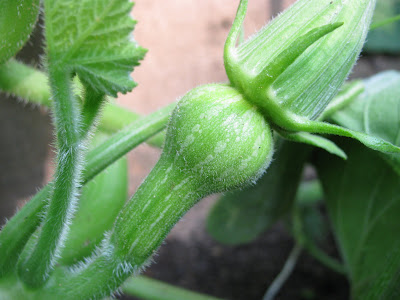


I just can't get enough of them this year. (I know some of you must think I'm nuts as you probably can't give the stuff away.) But I have a reason to be happy. You see last year we had a bad case of vine borers. So bad in fact that I lost all of my squash, pumpkins, and melon plants to it. Those evil borers killed every single last one.



So in effort to find a solution for the following year I did tons of research on the best organic pesticides to control these little devils. BT (Bacillus thuringiensis) I knew was an option, but it had a few drawbacks - one being that it didn't last very long and had to be applied often. Then I found spinosad and it was like a beam of golden light started shining on my garden (Ok... that's hokey and I'm exaggerating but you get my drift).
Perhaps the best thing about products containing spinosad is the safety factor for use around people, animals, and beneficial insects. Spinosad is safe even to use around adult butterflies and many insect predators and parasites. Spinosad keeps killing for up to 4 weeks instead of the one or two days residual you get with BT. In addition, spinosad kills thrips, which Bt doesn't faze.
I buy the Monterey Garden brand, which I order from Planet Natural.
Here's the product description:
Spinosad is a relatively new insect killer that was discovered from soil in an abandoned rum distillery in 1982. Produced by fermentation, Spinosad can be used on outdoor ornamentals, lawns, vegetables and fruit trees, to control caterpillars, thrips, leafminers, borers, fruit flies, and more. Spinosad must be ingested by the insect, therefore it has little effect on sucking insects and non-target predatory insects. Spinosad is relatively fast acting. The pest insect dies within 1 to 2 days after ingesting the active ingredient. Will not persist in the environment. Sunlight and soil microbes break it down into carbon, hydrogen, oxygen and nitrogen. Classified as an organic substance by the USDA National Organic Standards Board. Organic active ingredient produced by fermentation. B.T. replacement, more effective pest control. Can be used on vegetable & fruit crops, ornamentals, and turf. Controls caterpillars as well as beetles, leafminers, thrips and more!
Early in the growing season I applied spinosad on all my veggies in the raised beds. It prevented the usual onslaught I get with leaf loopers on my broccoli and cabbage. It also prevented the tomato worm. While my neighbors broccoli was filled with leaf looper holes I had none - well I did have holes but those were from the slugs - which is another story.... *sigh*
With all the rain we got I missed a spraying I would normally do a few weeks later. Then on one sunny day I came out to see this...

What you see here is evidence of a vine borer. You can't see it in the picture but in person you could see what looked like saw dust around the stem, which was also cracked and soft - this wasn't a case of normal stem splitting. I knew spinosad works and that the only reason I had this problem was because I missed a spraying. The good news - there was a solution.
Usually once the borer is inside vine itself there isn't much you can do except try to slit the stem, cut out the borer, and bury the stem in the dirt in hopes that it will take root and survive. But, with spinosad there is another option that works much better and that is to inject the pesticide directly into the stem.
I did this by mixing up the spinosad concentrate with water according to the package directions and then pouring a small amount into a plastic cup so I could draw it up easily into a syringe. (The product directions are for mixing up an entire gallon so be prepared to use the rest to spray your garden with because the mixture can not be stored). You can use any type of needle or garden syringe to do this job. I used an insulin syringe that I had when we cared for our diabetic cat a few years back but if you don't have a medical syringe you can order a garden syringe online - it doesn't have a fine needle point but works just a well. After filling up the syringe I injected the pesticide into the affected stem (I even injected into the stems of plants that weren't obviously infected just for good measure). The result - 3 weeks later my squash plants are still thriving and there is no sign of active vine borers. Each and every stem is sturdy and hard, and even the one that had the borer in it has has recovered - amazing!
If you haven't tried this product you may want to give it shot. I really does work.






















































.JPG)




.JPG)












14 comments:
I was so sad three years ago when they took over my 100 pound pumpkin plant and robbed me of my prize!!! I might have to try this!
Thanks for the info and the link. We did not have a garden this year, but I like knowing this info and I love squash!
Tootsie - So sorry to hear about the pumpkin. If you spray early enough and often you can prevent the vine borers from even boring inside the stem. That was my plan this year but the rain prevented me from doing that. Good thing is that the injection method worked to kill what was in there.
Mildred - You can use spinosad on any plant in the garden. It works great in my perennial garden too!
-Jackie
Wow, that's great you found a solution! I don't have a garden here but I'm going to mention it to my parents for their garden. So glad you'll have a full bounty this season!
~Michelle
Glad you are getting lots of squash this year, congrats on finding a solution to your problem. Nice healthy looking plants.
My dad has several types of squash growing in his garden. We didn't grow any this year just tomatoes and peppers.
It is always a drag when bugs get into the veggies! I am glad you found a cure(-:
Jack says he is feeling better tonight and thanks you for his well wishes(-:
My mom wrapped the stems of our zucchini this year with tin foil. Half under ground and a bit above. Not sure what pest it wards off, but we've had a bumper year. Up to 48 zucchini now. Glad to hear your treatments are working!!
I have been looking for an organic solution to my vine borers! They come every year. I have resorted to non-organic in the past, but only apply when there are no flowers to avoid hurting bees and butterflies. But this sounds much nicer. I wonder if this will work on iris borers too...
Thanks for the link and the heads up on a product that will work. Since my hubby raises bees I have to be so careful about what I use! Kim
So glad I was catching up here on your blog. Do you know if this spray will kill roly polys??? I found them munching on my squash and my cucumbers. My yard is roly poly nation!! I was never really bothered by them, except for the large number of them in my yard, until they started helping themselves to my veggies!
Thanks for sharing
Michelle
Great blog you have! I was looking on the Gardener's Supply website for slug and snail killer and they have something called "Sluggo Plus" with iron phosphate and spinosad. I was ready to purchase it but was curious about spinosad so I looked it up. There I found your blog. I am glad I did because you mentioned that the only thing it didn't work on were the slugs! Thanks for saving me time, money and aggravation!
@Paula, I would guess the spinosad spray doesn't work on slugs or snails as they are often hiding in the dirt during the day while we are spraying the leaves of a plant not necessarily saturating the ground. Sluggo is a pretty effective product and is used in the dirt so I will look for this SluggoPlus with spinosad and give it a try.
I have recently learned that Spinosad is toxic to bees. It seems the garden catalogs don't mention this much if at all. The injection method for squash vine borer would seem to be excellent (not an issue for the bees). Good idea!
Spraying the whole garden would seem to be bad for the bees.
I have used the tin foil method mentioned above with some success against the vine borer. It blocks them from laying their eggs at the base of the vine. But they might still lay some above that.
Perhaps spraying in the evening when bees aren't foraging might help some. I need to investigate this further.
Spinosad is organic but it is still a deadly poison that needs to be understood and used properly.
Thanks for the tip! I lost all of my squash & melons last year, so I'll try this if I have a problem this year. Found your blog through a friend of a friend. :-)
Post a Comment